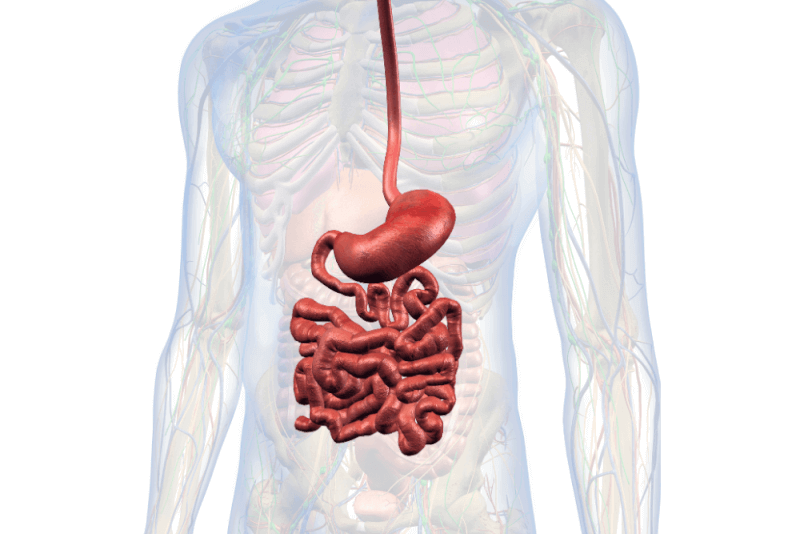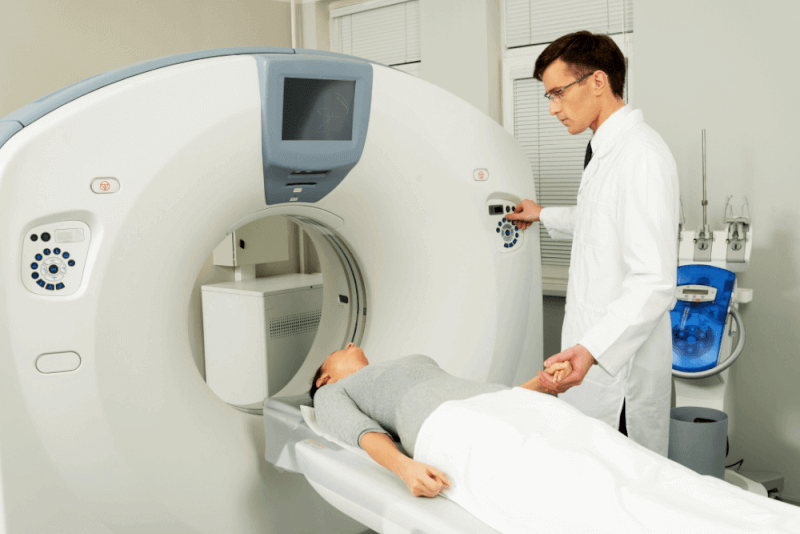What is small intestine prolapse?
Also known as enterocele, small intestine prolapse occurs when the small intestine descends into the lower pelvic cavity and creates a bulge by pushing the upper part of the vagina. Factors such as childbirth, aging, and other processes that put pressure on the pelvic floor can weaken the muscles supporting the pelvic organs, causing the small intestine to prolapse.
Personal care measures and other non-surgical methods are the first treatment options for managing small intestine prolapse. In severe cases, surgical procedures may be necessary to correct the condition.
Diagnosis methods for small intestine prolapse
Pelvic examination is used to confirm the diagnosis of small intestine prolapse. During the examination, the doctor may ask patients to take a deep breath and hold it while performing the Valsalva maneuver.
This action causes the small intestine to bulge downward. If the prolapse cannot be confirmed on the examination table, the patient may be asked to stand up for a physical examination.
Symptoms of small intestine prolapse
In mild cases of small intestine prolapse, there may be no symptoms. In more severe cases, symptoms may include the following:
- Relief of pulling sensation when lying down
- Pelvic fullness
- Pressure or pain
- Relief of lower back pain when lying down
- Soft tissue bulge in the vagina
- Vaginal discomfort
- Painful intercourse
Many women with small intestine prolapse may also experience prolapse of other pelvic organs such as the uterus, bladder, or rectum.
Causes of small intestine prolapse
Pressure on the pelvic floor is the primary cause of pelvic organ prolapse. Other conditions and activities that can contribute to or cause small intestine prolapse include the following:
- Pregnancy and childbirth
- Chronic constipation or straining during bowel movements
- Chronic cough or bronchitis
- Repetitive heavy lifting
- Being overweight or obese
Risk factors for small intestine prolapse
Factors that increase the risk of small intestine prolapse include the following:
- Pregnancy and childbirth
- Age
- Pelvic surgery
- Increased abdominal pressure
- Smoking
- Being of Hispanic or white descent
- Connective tissue disorders
How to prevent small intestine prolapse?
The following strategies can help reduce the risk of small intestine prolapse:
- Maintaining an ideal weight
- Preventing constipation
- Treating chronic cough
- Quitting smoking
- Avoiding heavy lifting
Treatment methods for small intestine prolapse
If the symptoms of small intestine prolapse do not bother the patient, treatment may not be necessary. For severe cases with bothersome symptoms, surgical techniques are recommended. Patients who want to avoid surgery or for whom surgery is too risky can take steps to prevent the condition from worsening.
In cases where the prolapse is mild or not noticeable, patients are monitored rather than treated. During this period, Kegel exercises are recommended to strengthen the pelvic muscles. Kegel exercises can help alleviate mild symptoms. Additionally, patients should avoid heavy lifting and constipation.
For mild to moderate small intestine prolapse, a treatment method called pessary can be applied. In this treatment, a silicone, plastic, or rubber device is inserted into the vagina to support the bulging tissue. Pessaries come in various sizes, so trials are necessary to find the right fit for the patient. Patients must also learn how to insert, remove, and clean the device.
Surgery for small intestine prolapse
In severe cases of small intestine prolapse, surgical procedures may be recommended. These procedures can be performed with or without robotic assistance, through the vagina or abdomen. During the procedure, the prolapsed small intestine is repositioned, and the connective tissue of the pelvic floor is tightened.
In some cases, a small synthetic mesh may be used to help support weakened tissues. After surgery, small intestine prolapse generally does not recur. However, increased pelvic pressure can cause further injury to the pelvic floor.
Benefits of small intestine surgery
Surgery for small intestine prolapse is the only treatment option in severe cases. The surgery eliminates symptoms and significantly improves the patient's quality of life.
Complications of small intestine surgery
Although recurrence is not common after bowel prolapse surgery, some complications can occur due to the surgical procedure. These complications include the following:
- Bleeding
- Infection
- Reactions to anesthesia
- Damage to pelvic organs
What should individuals with small intestine prolapse pay attention to?
Individuals with small intestine prolapse can alleviate symptoms by taking personal care measures, depending on the severity of the condition. These measures include:
- Performing Kegel exercises to strengthen the pelvic muscles and support weakened vaginal tissues
- Consuming plenty of fluids and fiber-rich foods to prevent constipation
- Avoiding heavy lifting
- Controlling cough
- Achieving an ideal weight
- Quitting smoking








